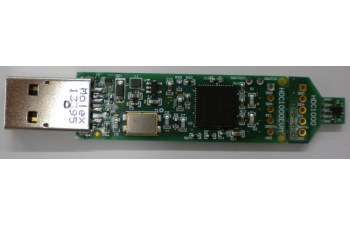Sample Python code for reading the
HDC1000EVM Temperature and Humidity Sensor

import serial
import binascii
#sample program to read Texas Instruments HDC1000EVM
#initialization and open the port
#possible timeout values:
# 1. None: wait forever, block call
# 2. 0: non-blocking mode, return immediately
# 3. x, x is bigger than 0, float allowed, timeout block call
ser= serial.Serial()
# Use which ever serial port works.
# the /dev/serial/by-path can change so do an ls to see what the
# device logged as
#ser.port= “/dev/ttyUSB0”
#ser.port= “COM4:”
#ser.port= “/dev/ttyACM1”
ser.port= “/dev/serial/by-path/platform-bcm2708_usb-usb-0:1.3:1.0”
ser.baudrate= 115200
ser.bytesize= serial.EIGHTBITS
#number of bits per bytes
ser.parity= serial.PARITY_NONE
#set parity check: no parity
ser.stopbits= serial.STOPBITS_ONE
#number of stop bits
#ser.timeout= None #block read
#ser.timeout= 1 #non-block read
ser.timeout= 2 #timeout block read
ser.xonxoff= False
#disable software flow control
ser.rtscts= False
#disable hardware (RTS/CTS) flow control
ser.dsrdtr= False
#disable hardware (DSR/DTR) flow control
ser.writeTimeout= 2 #timeout for write
try:
ser.open()
except Exception as e:
print(“error openserial port: “ + str(e))
exit()
if ser.isOpen():
try:
ser.flushInput() #flush input buffer, discarding all its contents
ser.flushOutput()#flush output buffer, aborting current output
#and discard all that is in buffer
#write data
ser.write(serial.to_bytes([0x4C,0x12,0x01,0x00,0x03,0x40,0xFB,0x02,0x7a]))
response = ser.readline()
print(“read Serial Number MSB = : 0x” + str(binascii.hexlify(response[7])) + str(binascii.hexlify(response[8])))
ser.write(serial.to_bytes([0x4C,0x12,0x01,0x00,0x03,0x40,0xFc,0x02,0x11]))
response = ser.readline()
print(“read Serial Number MID = : 0x” + str(binascii.hexlify(response[7]))
+ str(binascii.hexlify(response[8])))
ser.write(serial.to_bytes([0x4C,0x12,0x01,0x00,0x03,0x40,0xFd,0x02,0x04]))
response = ser.readline()
print(“read Serial Number LSB = : 0x” + str(binascii.hexlify(response[7]))
+ str(binascii.hexlify(response[8])))
ser.write(serial.to_bytes([0x4C,0x12,0x01,0x00,0x03,0x40,0xFe,0x02,0x3b]))
response = ser.readline()
print(“read Manufacturer = :” + str(response[7]) + str(response[8]))
ser.write(serial.to_bytes([0x4C,0x12,0x01,0x00,0x03,0x40,0xFF,0x02,0x2e]))
response = ser.readline()
print(“read Device ID = : 0x” + str(binascii.hexlify(response[7])) + str(binascii.hexlify(response[8])))
ser.write(serial.to_bytes([0x33]))
numOfLines = 0
while True:
response = ser.readline()
if (str(response).find(“,”) == -1):
print(“start data: “ + str(response))
else:
print(“Temperature: “ + str((“{0:.2f}”.format(((float(int((str(response).split(‘,’)[0]),16))/float(65536))
* 165) -40)))+ u”\u00B0″ + “C”)
print(“Temperature: “ +
str((“{0:.2f}”.format((((((float(int((str(response).split(‘,’)[0]),16))/float(65536))
* 165) -40) * 9) / 5) + 32)))+ u”\u00B0″ + “F”)
print(“Relative Humidity: “ +
str((“{0:.2f}”.format((float(int((str(response).split(‘,’)[1]),16))/float(65536))
* 100)))+ “%”)
numOfLines = numOfLines + 1
if (numOfLines > 10):
#ser.write(bytes(44))
ser.write(serial.to_bytes([0x34]))
response = ser.readline()
print(“read data: “ + str(response))
break
ser.close()
except Exception as e1:
print(“error ” + str(e1))
#ser.write(bytes(44))
ser.write(serial.to_bytes([0x34]))
response = ser.readline()
print(“last data: “ + str(response))
ser.close()
else:
print(“cannot open serial port “)
written by Doug Wyman
fantastic issues altogether, you just won a new reader.
What could you suggest about your put up that you made a few
days ago? Any certain?